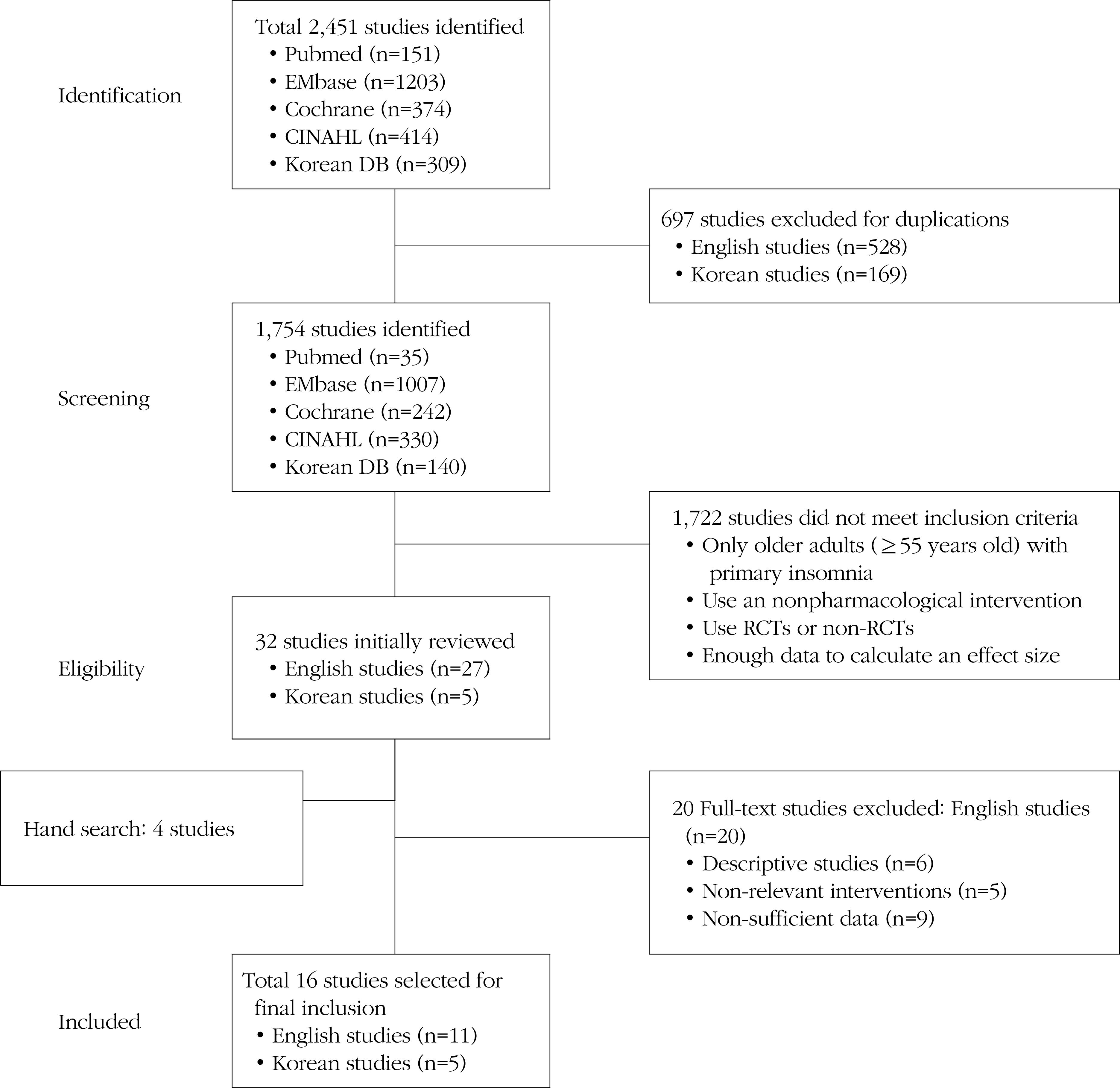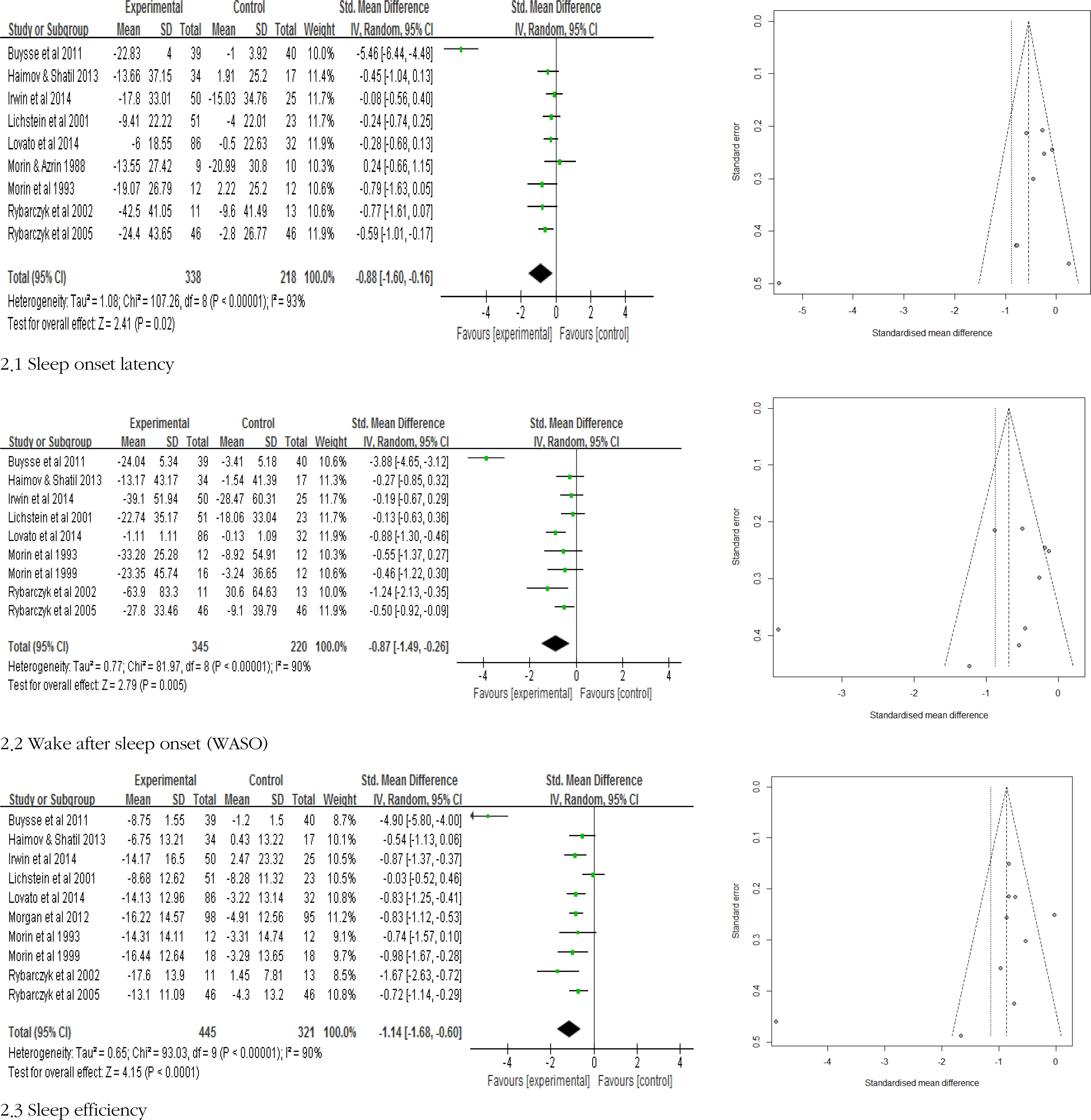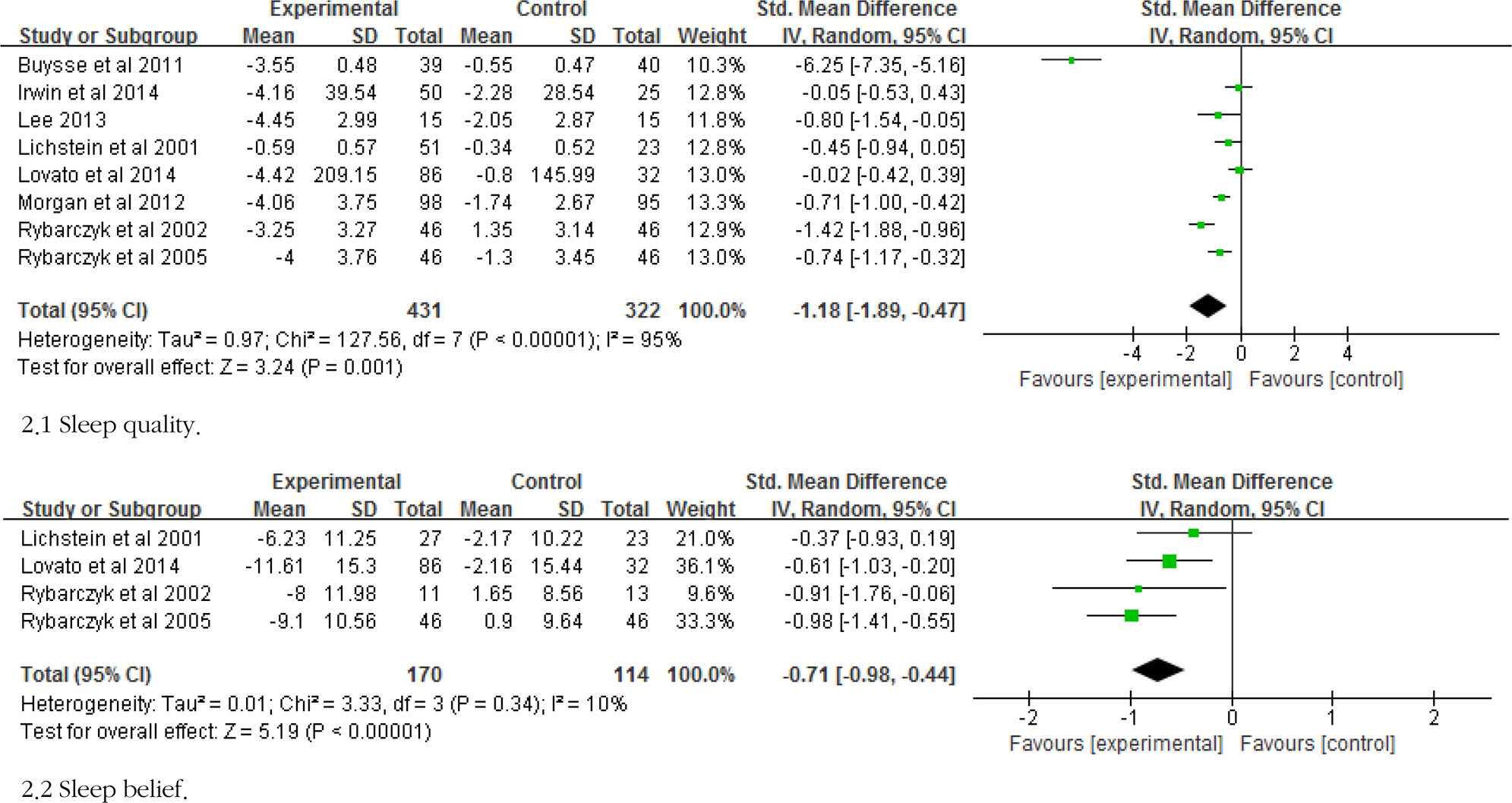Korean J Adult Nurs.
2016 Feb;28(1):13-29. 10.7475/kjan.2016.28.1.13.
Effects of Non-pharmacological Interventions on Primary Insomnia in Adults Aged 55 and Above: A Meta-analysis
- Affiliations
-
- 1Graduate School, College of Nursing, Korea University, Seoul, Korea.
- 2Department of Nursing, Sahmyook University, Seoul, Korea. ohpj@syu.ac.kr
- KMID: 2221705
- DOI: http://doi.org/10.7475/kjan.2016.28.1.13
Abstract
- PURPOSE
This study was performed to evaluate the effects of non-pharmacological interventions on sleep disturbance amongst adults aged 55 and above.
METHODS
PubMed, Cochrane Library, EMBASE, CINAHL and several Korean databases were searched. The main search strategy combined terms including non-pharmacological interventions and presence of insomnia. Non-pharmacological interventions included cognitive behavioral therapy, auricular acupuncture, aromatherapy, and emotional freedom techniques. Methodological quality was assessed using Cochrane's Risk of Bias for randomized studies and Risk of Bias Assessment tool for non randomized studies. Data were analyzed by the RevMan 5.3 program of Cochrane Library.
RESULTS
Sixteen clinical trials met the inclusion criteria with a total of 962 participants. Non-pharmacological interventions was conducted for a mean of 5.5 weeks, 7.7 sessions, and an average of 70 minutes per session. The effects of non-pharmacological interventions on sleep quality (ES=-1.18), sleep efficiency (ES=-1.14), sleep onset latency (ES=-0.88), awakening time after sleep onset (ES=-0.87), and sleep belief (ES=-0.71) were significant, and their effect sizes were ranged from moderate to large. However, the effects on total sleep time and insomnia severity were not significant.
CONCLUSION
The findings of the current study suggest that non-pharmacological interventions have a positive impact on attitudes and beliefs about sleep, sleep quality, sleep duration, and sleep efficiency. Therefore, the findings of the study provide an evidence to incorporate various non-pharmacological interventions into nursing practice to improve both sleep quality and quantity in patients with insomnia.
MeSH Terms
Figure
Cited by 2 articles
-
Quality of Sleep and Depression for Patients in Psychiatric Hospitals
Sukgyoung Jeong, Aeyoung So
J Korean Acad Psychiatr Ment Health Nurs. 2017;26(4):374-381. doi: 10.12934/jkpmhn.2017.26.4.374.Factors Affecting Sleep Disturbances in Hospitalized Patients with Colorectal Cancer undergoing Chemotherapy: A Retrospective Study
Jihyeon Song, Smi Choi-kwon
Korean J Adult Nurs. 2019;31(1):100-108. doi: 10.7475/kjan.2019.31.1.100.
Reference
-
1.Kwon KH., Suh SR., Suh BD. Sleep patterns and factors influencing sleep in institutionalized elders and elders living at home. Journal of Korean Gerontological Nursing. 2010. 12:131–41.2.Basta M., Chrousos GP., Vela-Bueno A., Vgontzas AN. Chronic insomnia and stress system. Sleep Medicine Clinics. 2007. 2:279–91. http://dx.doi.org/10.1016/j.jsmc.2007.04.002.3.Jun SS., Ha SJ. Sleep disorder experience in older patients with depression. Journal of Korean Academy of Nursing. 2014. 44(3):270–9. http://dx.doi.org/10.4040/jkan.2014.44.3.270.
Article4.Glass J., Lanctot KL., Herrmann N., Sproule BA., Busto UE. Sedative hypnotics in older people with insomnia: meta-analysis of risks and benefits. British Medical Journal. 2005. 331(11):69–75. http://dx.doi.org/10.1136/bmj.38623.768588.47.
Article5.Stepanski EJ. Hypnotics should not be considered for the initial treatment of chronic insomnia. Con. Journal of Clinical Sleep Medicine. 2005. 1(2):125–8.6.Espie CA. Insomnia: conceptual issues in the development, persistence, and treatment of sleep disorder in adult. The Annual Review of Clinical Psychology. 2002. 53:214–43. http://dx.doi.org/10.1146/annurev.psych.53.100901.135243.7.Koo YJ., Koh HJ. Analysis of intervention research about sleep of the elderly in Korea. Keimyung Journal of Nursing Science. 2009. 13(1):63–71.8.Jaffe S., Patterson DR. Treating sleep problems in patients with burn injuries: practical considerations. Journal of Burn Care & Rehabilitation. 2004. 25(3):294–305. http://dx.doi.org/10.1097/01.BCR.0000124793.99886.6A.
Article9.Wang MY., Wang SY., Tsai PS. Cognitive behavioural therapy for primary insomnia: a systematic review. Journal of Advanced Nursing. 2005. 50(5):553–64. http://dx.doi.org/10.1111/j.1365-2648.2005.03433.x.
Article10.De Niet GJ., Tiemens BG., Kloos MW., Hutschemaekers GJ. Review of systematic reviews about the efficacy of non-pharmacological interventions to improve sleep quality in insomnia. International Journal of Evidence-Based Healthcare. 2009. 7(4):233–42. http://dx.doi.org/10.1111/j.1744-1609.2009.00142.x.
Article11.Montgomery P., Dennis JA. Cognitive behavioural interventions for sleep problems in adults aged 60+. Cochrane Database of Systematic Reviews. 2003. 1:CD003161. http://dx.doi.org/10.1002/14651858.CD003161.
Article12.Okajima I., Komada Y., Inoue Y. A meta-analysis on the treatment effectiveness of cognitive behavioral therapy for primary insomnia. Sleep and Biological Rhythms. 2011. 9(1):24–34. http://dx.doi.org/10.1111/j.1479-8425.2010.00481.x.
Article13.Cheng SK., Dizon J. Computerised cognitive behavioural therapy for insomnia: a systematic review and meta-analysis. Psychotherapy and Psychosomatics. 2012. 81(4):206–16. http://dx.doi.org/10.1159/000335379.
Article14.Kim SY., Park JE., Seo HJ., Seo HS., Song HJ., Shin CM, et al. NECA's guidance for undertaking systematic reviews and meta-analyses for intervention. Seoul: National Evidence-based Healthcare Collaborating Agency;2011.15.Higgins JP., Green S. Cochrane handbook for systematic reviews of interventions, version 5.1.0. [updated March 2011]. The Cochrane Collaboration;Available from:. http://www.cochrane-handbook.org.16.Cohen J. Statistical power analysis for the behavioral sciences. 2nd ed.Hillsdale, NJ: Lawrence Erlbaum Associates;1998.17.Lee J. Meta-analysis. Journal of Korean Endocrine Society. 2008. 23(6):361–78. http://dx.doi.org/10.3803/jkes.2008.23.6.361.
Article18.Oh SS. Meta-analysis: theory and practice. Seoul: Konkuk University Press;2002.19.Morin CM., Bootzin RR., Buysse DJ., Edinger JD., Espie CA., Lichstein KL. Psychological and behavioral treatment of insomnia: update of the recent evidence (1998-2004). Sleep. 2006. 29(11):1398–414.
Article20.Smith MT., Perlis ML., Park A., Smith MS., Pennington J., Giles DE, et al. Comparative meta-analysis of pharmacotherapy and behavior therapy for persistent insomnia. The American Journal of Psychiatry. 2002. 159:5–11.
Article21.Harvey L., Inglis SJ., Espie CA. Insomnias'reported use of CBT components and relationship to long-term clinical outcome. Behaviour Research and Therapy. 2002. 40:75–83.22.Vincent N., Lionberg C. Treatment preference and patient satisfaction in chronic insomnia. Sleep. 2001. 24:411–7.
Article23.Oh PJ., Jang ES. Effects of psychosocial interventions on cortisol and immune parameters in patients with cancer: a meta analysis. Journal of Korean Academy of Nursing. 2014. 44(4):446–57. http://dx.doi.org/10.4040/jkan.2014.44.4.446.24.Goedendrop MM., Gielissen MF., Verhagen CA., Bleijenberg G. Psychosocial interventions for reducing fatigue during cancer treatment in adults. The Cochrane Database of Systematic Reviews. 2009. 1:CD006953. http://dx.doi.org/10.1002/14651858.CD006953.pub2.25.Morin CM., Culbert JP., Schwartz SM. Nonpharmacological interventions for insomnia: a meta-analysis of treatment efficacy. The American Journal of Psychiatry. 1994. 151(8):1172–80.26.Sok SH., Kim KB. Effects of auricular acupuncture on insomnia in Korean elderly. Journal of Korean Academy of Nursing. 2005. 35(6):1014–24.
Article27.Kamel NS., Gammack JK. Insomnia in the elderly: cause, approach, and treatment. The American Journal of Medicine. 2006. 119(6):463–9. http://dx.doi.org/10.1016/j.amjmed.2005.10.051.
Article28.Schutte-Rodin S., Broch L., Buysse D., Dorsey C., Sateia M. Clinical guideline for the evaluation and management of chronic insomnia in adults. Journal of Clinical Sleep Medicine. 2008. 4:487–504.
Article29.Kwon KH. The development of measurement tool of sleep quality of the elderly [dissertation]. Daegu: Kyungpook National University;2009. p. 1–75.30.Morin CM., Blais F., Savard J. Are changes in beliefs and attitudes about sleep related to sleep improvements in the treatment of insomnia? Behaviour Research and Therapy. 2002. 40:741–52.
Article
- Full Text Links
- Actions
-
Cited
- CITED
-
- Close
- Share
- Similar articles
-
- The Effects of Non-pharmacological Interventions on Sleep among Older Adults in Korean Long-term Care Facilities: A Systematic Review and Meta-analysis
- Recent Advances in Diagnosis and Treatment of Insomnia Disorder
- Effects of medication adherence interventions for older adults with chronic illnesses: a systematic review and meta-analysis
- Insomnia in Medical Illnesses: The Secondary Insomnia
- Effects of Non-pharmacological Interventions on Cancer Patients with Sleep Disorder: A Meta-analysis




